You may be ready to be done with dirty diapers but is your child?
Many parents think that picking a day/time/weekend that would work well for them and diving straight in is the best way to get their kids potty trained.
However, you want to avoid doing this and instead start potty-learning when your child is showing readiness signs to ensure they are on the right track.
There are many signs that your child is not ready to potty train.
It’s important to know when they’re ready because it can be extremely frustrating and discouraging for both of you if you start too early.
I have two kids of my own that I have potty trained and it was SO MUCH easier when we waited until they were ready.
In this post, we will go over some signs that your child may not be ready to potty train and how to encourage interest.
Make sure to grab my free printable potty training readiness signs handout as well!
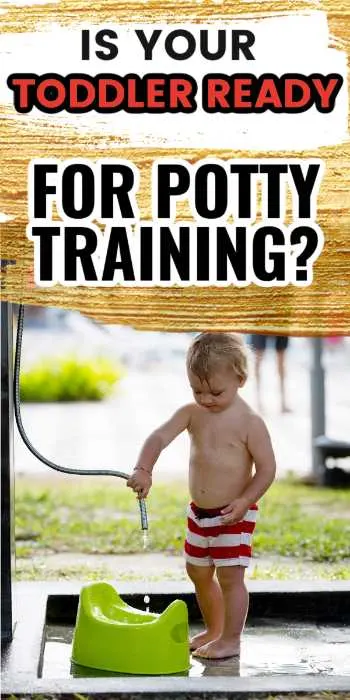
(This post may contain affiliate links. To read our full disclosure policy click here.)
What is Potty Training Readiness?
When it comes to potty training readiness, every child is different.
Some toddlers are ready as early as 18 months, while others may not be ready until they are 3 or 4 years old.
As you can see the age range for potty learning varies widely.
There are a few key signs that can indicate whether your child is ready to start potty training, including
- expressing an interest in using the toilet
- staying dry for longer periods of time
- understanding and following simple instructions
- having all physical skills needed
You can grab my complete list of signs your child may be ready here
If you think your child is showing signs of potty training readiness, the best thing you can do is follow your child’s lead!
With a little patience and encouragement, you can help your child make a successful transition to using the toilet.
Signs Your Child is Not Ready for Potty Training
Now it is time to jump into some signs that your child is not ready to transition to the toilet.
If you are seeing some of these things you may want to wait a bit before attempting to start training.
If your child is not ready it will make the process so much harder (trust me…I have made this mistake myself!)
If you do start toilet training and some of these things pop up then it may be a sign that it is time to step back and wait a little while.
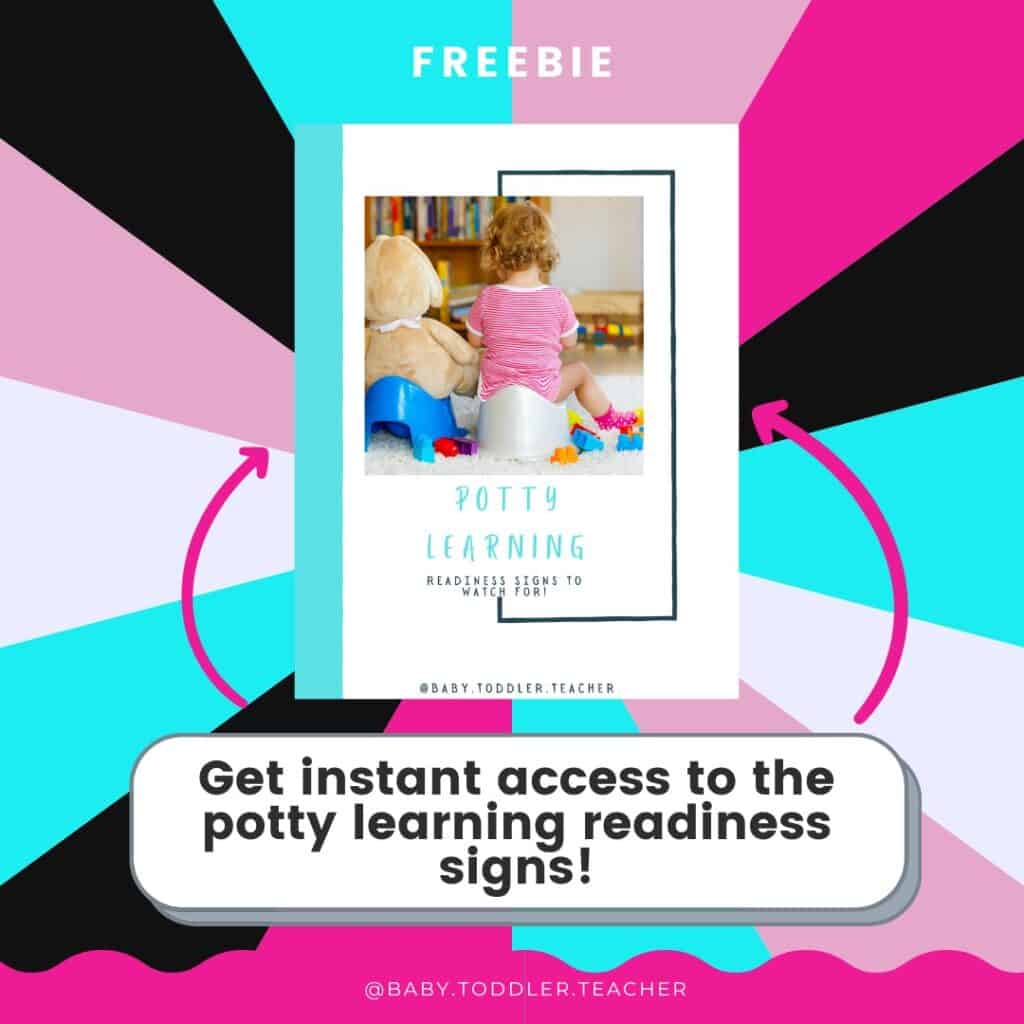
They Have Trouble Sitting on the Potty
If your child is having trouble sitting on the potty then they are most likely not ready to start using it.
This position is key for success in going to the toilet and if they can’t do it then it may be a sign that they need more time.
If you have only tried on the large potty then you may want to try using a small potty chair as you want your little one to feel safe and comfortable.
With both of my children, I used a 3-in-1 potty chair (this is the one we used) and I highly recommend it!
It served its purpose when my children were little and it helped make the transition to the big toilet easy.
You can find my recommendations on supplies I would recommend having on hand HERE.
They Refuse to Go
If your child is refusing to use the toilet, it may be best to wait a bit before starting potty training.
This is a power struggle that you do not want to get into!
It’s important to remember that potty training is a process, and it may take some time for your child to get comfortable with the idea of using the toilet.
In the meantime, you can help your child become more familiar with the concept by frequently talking about using the toilet and encouraging them to sit on the toilet even if they don’t need to go.
You can also try reading books about potty training together or watching videos about it.
By taking things slow and being patient, you can help your child make a smooth transition to using the toilet.
They Struggle with Constipation
When your child is constipated, their bowel movements are infrequent and/or difficult to pass.
This can be a painful and frustrating experience for them.
As a result, they may resist toilet training.
It’s important to avoid putting pressure on your child to use the toilet when they are constipated.
Instead, provide them with plenty of opportunities to use the bathroom in a relaxed and comfortable setting.
Make a plan with your pediatrician on how to handle constipation and pick a potty training method that is gentle and supportive.
With time and patience, most children will eventually overcome their issues with constipation and be ready for potty training.
Does Not Have the Physical Skills
When it comes to toilet training, it is important to wait until your child is physically ready.
This means that they should be able to stand up and sit down independently, without assistance.
They should also be able to communicate when they need to go to the bathroom.
If your child does not yet have these skills, then they are not ready for toilet training.
Forcing them to use the toilet before they are ready can be frustrating and overwhelming for both of you.
Instead, focus on teaching them the necessary skills and wait until they are physically and emotionally ready to start toilet training.
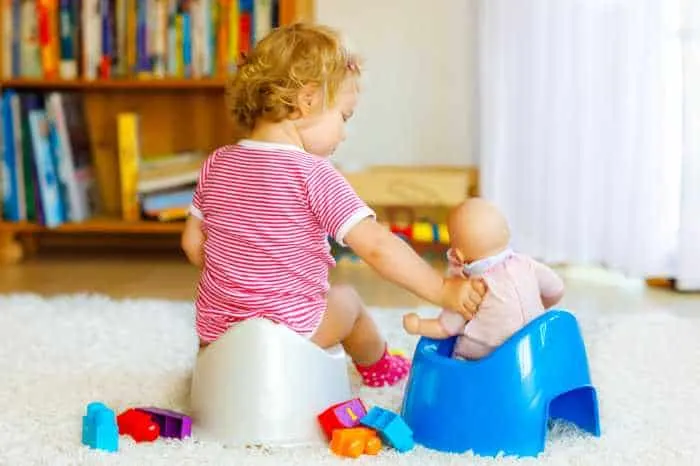
Is Scared of the Toilet
Potty training can be a daunting task for both parents and children.
One common issue that can arise is a child becoming scared of the toilet.
This can happen for a variety of reasons, such as a bad experience or simply being afraid of the unknown.
The sound of flushing can be scary to some children as well!
If your child is scared of the toilet, it’s important to avoid pushing them into it but instead focus on figuring out why they are scared of the toilet and how you can be supportive.
Forcing them to use the toilet when they’re not ready can only make the situation worse and create a negative association.
Instead, try to focus on making the potty experience more positive.
You need to get curious about the fear in order to find a way to help your child feel safe when using the potty.
With time and patience, your child will eventually overcome their fear and be able to use the toilet like a pro.
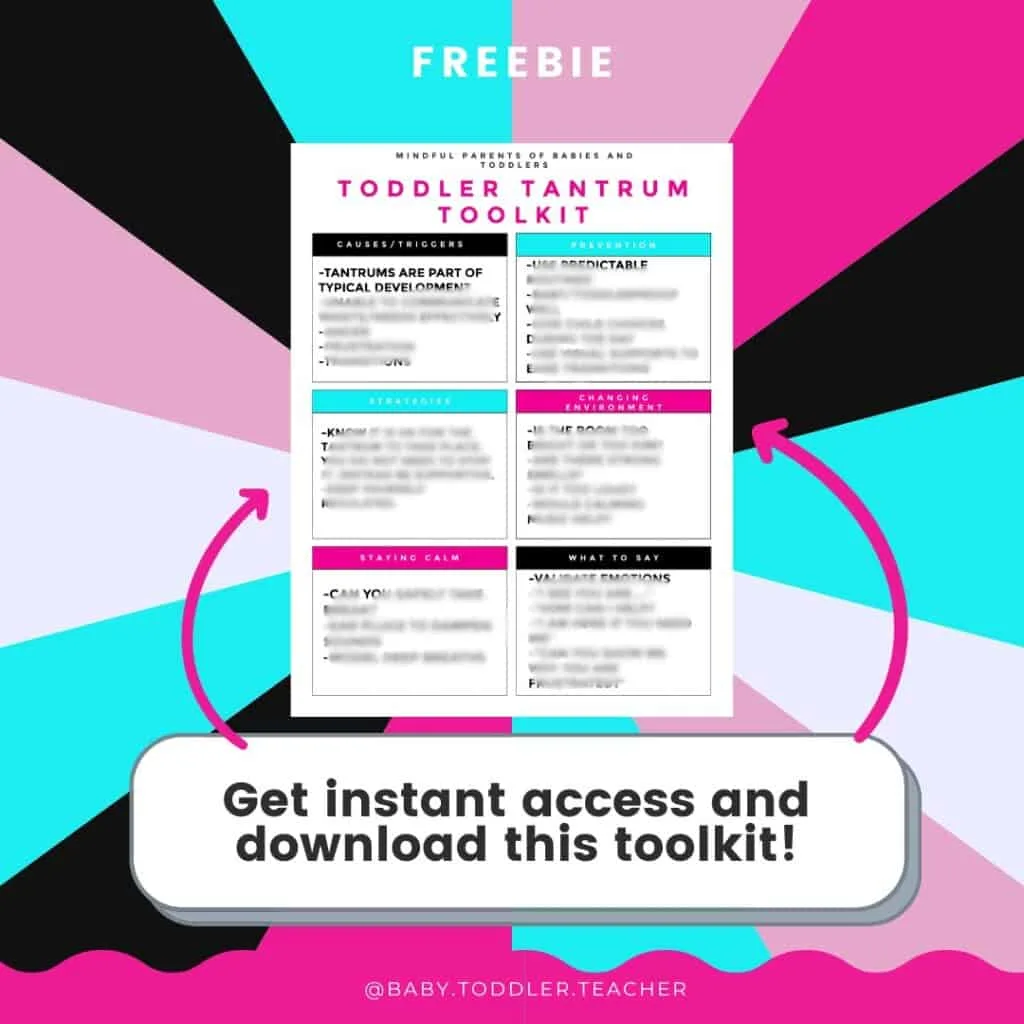
No Consistent Dry Times When in Diapers
One of the most important things to consider when toilet training your child is whether or not they are having consistent dry diapers.
If your child is not having a consistent dry diaper, then it is best to avoid toilet training.
There are a few reasons for this.
First, if your child is not having a consistent dry diaper, it means that they are not yet ready physically to control their bladder.
Second, if your child is not having a consistent dry diaper, it is likely that they will become frustrated with toilet training and give up.
Finally, if your child is not having a consistent dry diaper, they may end up becoming discouraged and feeling like they are not doing well.
All of these things can make it more difficult to successfully toilet train your child.
Not Showing Interest in Using the Toilet
One of the key indicators that a child is ready for toilet training is a willingness to use the toilet.
If your child does not seem interested in using the toilet, it is best to avoid toilet training.
Forcing a child to use the toilet before they are ready can lead to frustration and behavioral problems.
Instead, wait until your child begins showing an interest in using the toilet.
Signs that your child may be ready include wanting to wear underwear, expressing interest in using the toilet, and being able to stay dry for several hours at a time.
Once your child is showing these signs, you can begin working on toilet training.
With patience and positive reinforcement, you will soon have a child who is successfully using the toilet.
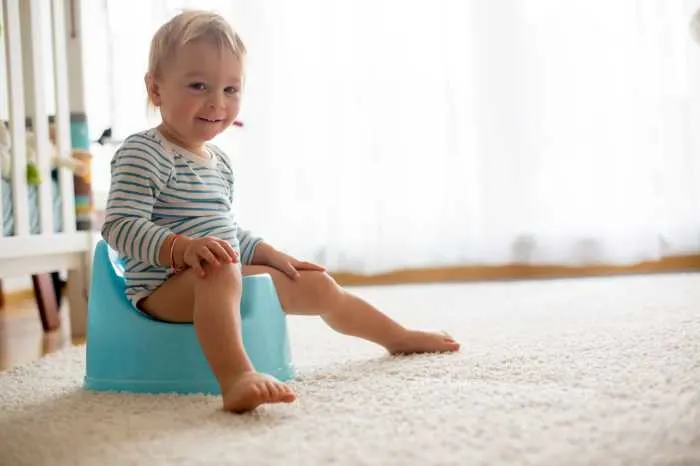
When Should You Start Potty Training?
If you’re potty training a toddler, you know that it can be a challenging (and sometimes messy) process.
To help make things go more smoothly, I’ve created a free potty learning readiness handout.
Ready to switch your mindset from potty training to potty learning?
Frequently Asked Questions
Most children are potty trained between the ages of 2 and 4.
However, every child is different, and some may be ready earlier or take longer to master this milestone.
There are a few signs that your child may be ready for potty training, such as showing an interest in the toilet, staying dry for longer periods of time, or regularly having a bowel movement at the same time each day.
If you start to potty train your child and they seem uninterested or resistant, it may be best to wait a few months and try again.
Ultimately, the best indicator of readiness is your child’s own behavior.
When they are ready, they will let you know.
No! Many children will start to use the potty around age 3.
One of my children trained shortly after their 3rd birthday while the other one trained just a few days before their 3rd birthday.
There is no right or wrong age when it comes to potty training…it is all about when your child is ready at their own unique time.
It can be difficult to know for sure if your child is ready 100%.
If your child is showing readiness signs then I would follow their lead and give it a try.
If it does not go well, you can always stop and go back to diapers.
Many first attempts at potty learning do not work out!
I would recommend skipping rewards. This can sometimes create a pattern where the child is only motivated to use the potty when they get a reward which can be a hard habit to break!
If you start the potty learning process and it is not going well it is ok to stop and go back to pull-ups or diapers.
Give it some more time and then try again in a few weeks and see what happens.
Related Posts You Will Enjoy
Gross Motor Activities for Toddlers that Burn Energy!
How to Get Your Toddler to Listen without Yelling!
Gifts for Toddlers that aren’t Toys
Strategies for Langauge Development in Early Childhood
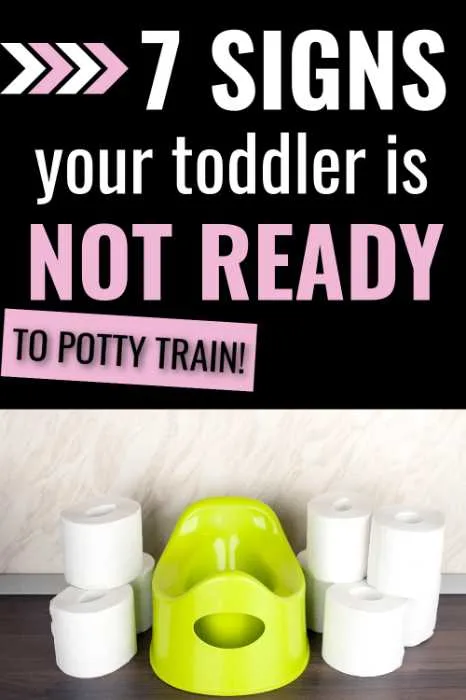

Kayla O’Neill has a master’s degree in education as well as a bachelor’s degree in special education with an emphasis in early childhood education. She has been working as a developmental therapist with babies and toddlers in early intervention since 2012. She is also a mom with two young children.